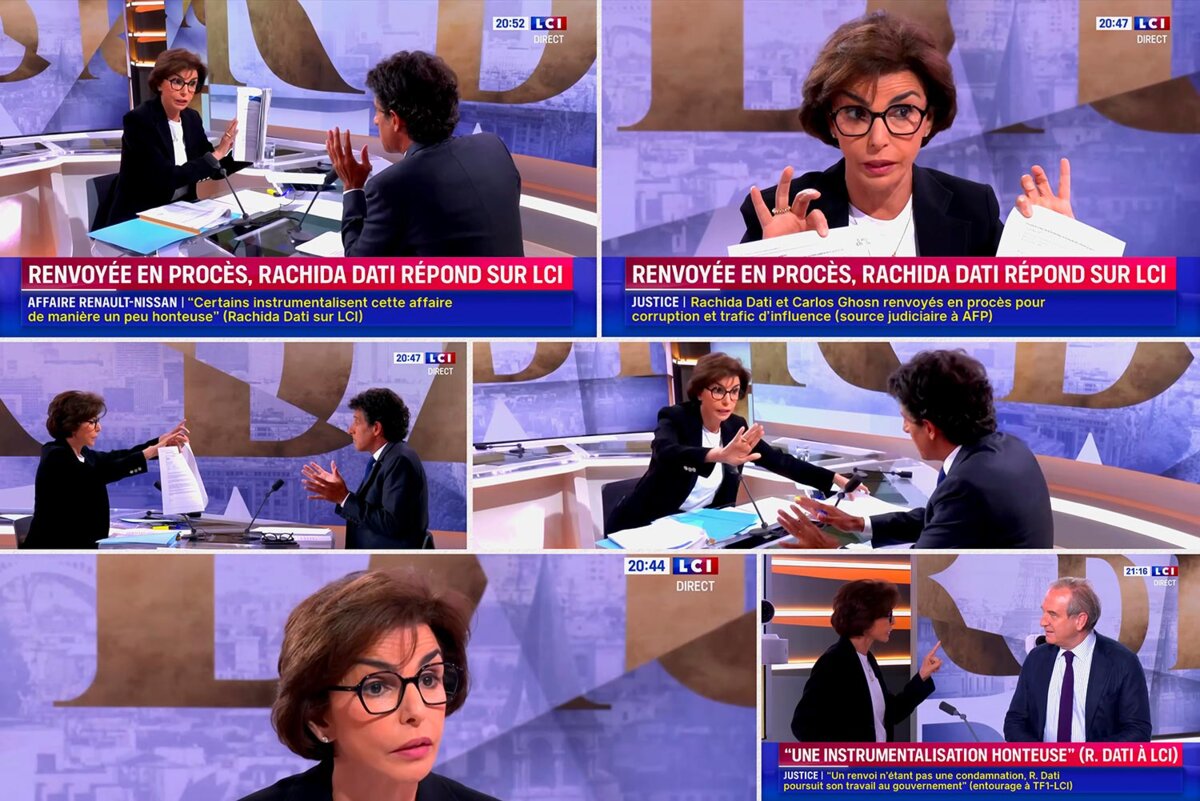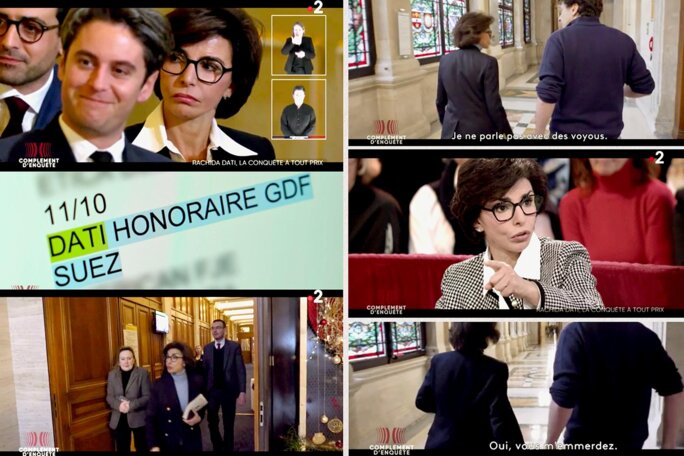When Rachida Dati appeared on LCI news channel on the evening of July 22nd she adopted the approach that attack is the best form of defence. France's culture minister cast doubt on the judges who had just sent her to stand trial in the Renault lobbying case, singled out one of the investigating magistrates in that case by name and went after the financial crimes prosecution unit, the Parquet National Financier (PNF).
Nor was that the end of it. After her interview, the minister stayed behind to listen in on what the various studio pundits were saying about her. Suddenly, she confronted a journalist from Le Figaro newspaper who had expressed some doubts about her version of events. “I’m going to stay in the [production] control room,” she warned, before leaving the set.
Was this a joke? Not really. For years now, and even more since becoming minister of culture and facing questions over her integrity in public life, Rachida Dati has been threatening and leaning on the press without any comeback.
“Hello, would you be available this evening at 6.20pm to go over your investigation into Rachida Dati?” On June 5th, Clément Lacombe, a journalist at Le Nouvel Obs weekly news magazine, received an invitation from commercial news channel BFMTV to speak about his latest scoop on the culture minister. That same evening public broadcaster France 2, working jointly with the magazine, was going to air a report on her on its 'Complément d’enquête' investigation programme and reveal never-before-seen accounts documents.

Enlargement : Illustration 1

In addition to the Renault case, Rachida Dati is suspected of having acted as a lobbyist for French utility multinational GDF-Suez (now ENGIE) during her time as a Member of the European Parliament (MEP) between 2009 and 2013. She has always denied the claim, but the reporters involved in the media investigation have unearthed fresh documents showing she had received 300,000 euros from the energy firm without ever declaring it.
Most newsrooms already knew how explosive the scoop was. They had seen the article a few days earlier under embargo, and BFMTV was clearly keen to run it. The channel discussed it in editorial meetings and lined up the authors of the scoop for different time slots to appear on set. One crew was even assigned to follow the minister on a trip and get her to respond.
But in the end, not a single word was said about the case on the news channel. “I was put on the schedule at 11am, confirmed again at 4pm, crossed all of Paris and they cancelled my appearance when I was just yards from BFMTV’s offices,” said Clément Lacombe. The reason for the sudden change? “Urgent: we’re cancelling as the prosecution hasn’t taken up the case,” texted the scheduler on the channel's Olivier Truchot and Alain Marschall news programme, while still promising to invite him back the next day. “But I never heard from them again,” the Nouvel Obs journalist added.
According to Mediapart's sources, Tristan Waleckx, presenter and editor-in-chief of “Complément d’enquête”, and reporter Louis Milano-Dupont, who did not reply to Mediapart's requests for comment, had also been scheduled to appear on two separate shows that Thursday and Friday. But they, too, were dropped.
BFMTV’s editor insulted
Inside BFMTV, there was concern: had the minister leaned on management to bury these new revelations? “There was a real chance to make something of this news,” said one dismayed newsroom journalist. “Besides, the ‘Complément d’enquête’ piece quotes our own findings in a previously broadcast ‘Ligne rouge’ documentary [editor's note, 'Ligne Rouge' is BFMTV's brand name for its documentaries]. We could easily have aired it again, as we often do.”
Several journalists questioned the senior editorial team, and even wrote in protest over the decision to drop the story. Management swore there had been no outside pressure and claimed they had simply chosen not to run it until the “justice system” took it up. “That’s a daft reason,” said one reporter, “since we often cover allegations well before any judge or prosecutor gets involved.”
Speaking to Mediapart, BFMTV editor-in-chief Camille Langlade “flatly denied” there had been any pressure from the minister. “We cover a story revealed by colleagues elsewhere once it’s picked up by the justice system, or when we can provide our own information,” she said. “In agreement with the police and justice team [editor's note, of reporters], I therefore decided we wouldn’t run it, and those who’d been lined up by our programmes were dropped. You can debate that choice, but it was an editorial decision.”
What’s your problem? I’ve every right to tell BFMTV not to ask questions that have nothing to do with the topic of a [ministerial] visit.
Although the channel denies there was any pressure, the minister’s entourage had, according to Mediapart's sources, contacted Camille Langlade at least once on Friday June 6th. The channel had sent a crew to follow the culture minister during a trip to Fontainebleau south-east of Paris and wanted, as is common practice, to get her reaction to the France 2 revelations.
An angry Emmanuelle Dauvergne, the minister’s special adviser, phoned the editor to rebuke and insult her. On the ground, she also physically blocked the BFMTV journalist from asking any questions. “It was a ‘culture visit’ and the BFMTV journalists wanted to ask something about ‘Complément d’enquête’. I told them they had no business doing that and rang their bosses to say it wasn’t right,” she said, playing down the incident and dismissing talk of insults as “gossip”.
Did she also lean on them to stop BFMTV from mentioning the GDF-Suez scoop? “What’s your problem? I’ve got every right to tell BFMTV not to ask questions that have nothing to do with the topic of a [ministerial] visit, haven’t I?” she responded. “BFM could’ve easily covered that story.”
Pressure to pull an investigative story
Not long before, however, the newsroom had already felt the wrath of the woman who is also mayor of Paris’s 7th arrondissement or district. When she was appointed minister in 2024, BFMTV was working on a long piece about her, called “Rachida Dati, the unsinkable”. This documentary touched on her court cases, revealed the steps she had allegedly taken to block her own brother’s book while serving as justice minister under President Nicolas Sarkozy, and detailed how she supposedly got an interview on TF1 television censured.
As reported by Le Nouvel Obs and Mediapart, the minister had “gone all out” to get the piece “dropped”, seeking help from Nicolas de Tavernost, former head of M6 television station and acting chairman of BFMTV. Philippe Corbé, then head of news at the 24-hour news channel, had even offered to resign to ensure the documentary aired without cuts.
Asked at the time by Mediapart, Rachida Dati did not deny the claims. “This documentary was commissioned in January [2024], as soon as I arrived at the Ministry of Culture, by Marc-Olivier Fogiel [editor's note, at the time CEO of BFMTV] and [photo agency boss] Mimi Marchand at the request of Xavier Niel [editor's note, telecom billionaire and media owner], to damage me in my role as minister of culture,” she claimed. “Because Niel, Dreyfuss [editor's note, Arthur Dreyfuss, head of Altice France, the channel’s parent company], Olivennes [editor's note, Denis Olivennes chair of the board at media company CMI France] have major interests with the Ministry of Culture, and Fogiel was hoping to get the top job at [public broadcster] France Télévisions. I’ve got the proof for all of it – but since I’m the one to bring down…”
The most vital thing is that an investigation launched back in January was seen through to the end, despite the hurdles, because Rachida Dati had indeed made it clear she was against it.
The pressure was enough to stir serious misgivings inside the channel. According to minutes obtained by Mediapart, BFMTV’s leadership was forced to explain itself to staff at an editorial meeting held on October 17th 2024. They denied ever thinking of pulling the documentary, but did not deny that the minister had tried to lean on them.
“Did Rachida Dati put pressure on Nicolas de Tavernost or the shareholders because she didn’t want – and we know this – the documentary to air?” asked one member of the channel's association of journalists (SDJ). “People will always try to apply pressure. Our job is to shield you from it,” replied Jean-Philippe Baille, head of news at the BFM-RMC group.
“The most vital thing in all of this,” added Philippe Corbé, the former head of news, “is that an investigation launched in January was seen through to the end, despite the hurdles, because Rachida Dati had indeed made it clear she was against it.”
Serious accusations against France Télévisions
This is Rachida Dati’s trademark approach: contacting newsroom heads in advance to try and censor stories about her, even if it involves threats or insults. In one investigation Mediapart described how she had tried to lean on Le Nouvel Obs and Libération newspaper to stop them from running certain reports. Since then, nothing seems to have held her in check.
On June 10th investigative publication Le Canard Enchaîné reported fresh threats from the former justice minister against the boss of public broadcaster France Télévisions, Delphine Ernotte, aimed at stopping the airing of the “Complément d’enquête” report. “I’ll have Ernotte’s scalp before I leave the Ministry of Culture!” she is said to have stated in private, a claim she denies.

Enlargement : Illustration 2

In the documentary in question, the mayor of the 7th arrondissement of Paris even calls the reporters “thugs” and accuses them of trying to pay for a relative’s testimony. “I’ve got all the messages. A ‘Complément d’enquête’ journalist told my brother, ‘we’ll pay you to give evidence’. That’s the truth, I’ve got all the messages. You pay people…” she claimed.
In private, ministerial advisor Emmanuelle Dauvergne has lent weight to this story, and claims to have texts from the journalist offering cash in exchange for stories, and says she rang Christophe Tardieu, France Télévisions’ secretary general, about it. Does she have proof of these serious claims? “Madame Dati has the hard facts, but we’ll use them when we want to,” she threatened. “The proof will come out when it needs to, we’ve got all we need.” And has the matter been reported to the legal authorities? “There’s no rush. They aired their ‘Complément d’enquête’, and what did it lead to? Nothing at all.”
The minister’s adviser again denies any pressure, but admits “calling France Télévisions management on a regular basis”. “Yes, I have relations with Mr Tardieu and Mr Sitbon-Gomez [editor's note, France Télévisions executives]. It’s a supervisory relationship. When we’ve got questions, yes, we ring them. Same with Radio France and other outlets.” Does this include applying pressure? “That's rubbish,” Emmanuelle Dauvergne responded. “I didn’t threaten France Télé over ‘Complément d’enquête’.”
The France 2 journalists, who were not publicly defended by their management, strongly denied these serious claims about payment for interviews. After that, the minister went after high-profile journalist and presenter Patrick Cohen, once again threatening legal action.
Even after all this, President Emmanuel Macron and several government ministers continue to back Rachida Dati no matter what. They all speak of the “presumption of innocence” and turn a blind eye to the actions of a minister who is supposed to be upholding the freedom of the press.
------------------------------------------------------------------------------
- The original French version of this report can be found here.
English version by Michael Streeter


